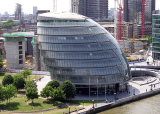
In a concerted effort to further curb prohibited Russian metal exports, the United Kingdom and the United States have expanded existing bans to encompass the world's two
largest metal exchanges.
The London Metal Exchange (LME) and the Chicago Mercantile Exchange (CME) will cease trading new aluminum, copper, and nickel produced in Russia. Metals rank as Russia's primary export commodity after energy, although their value has witnessed a decline since the invasion of Ukraine, plummeting from $25 billion in 2022 to $15 billion in 2023, largely due to the concerted efforts of the G7 and its allies to curb the market. Today's action represents a significant step towards constraining Russia's ability to generate revenue from its diminishing metal exports, further hampering President Vladimir Putin's funding for the ongoing conflict in Ukraine.
Chancellor of the Exchequer, Jeremy Hunt, emphasized the importance of allied action in thwarting Putin's capacity to sustain the conflict: "Disabling Putin’s capacity to wage his illegal war in Ukraine is better achieved when we act alongside our allies. Thanks to Britain’s leadership in this area, our decisive action with the U.S. to jointly ban Russian metals from the two largest exchanges will prevent the Kremlin funneling more cash into its war machine."
Echoing Hunt's sentiments, U.S. Secretary of the Treasury, Janet L. Yellen, underscored the collaborative effort aimed at curtailing Russia's revenue streams: "Our new prohibitions on key metals, in coordination with our partners in the United Kingdom, will continue to target the revenue Russia can earn to continue its brutal war against Ukraine."
The initiative to restrict Russian metal trade was first announced by the Prime Minister in May 2023, with UK legislation to directly prohibit imports of Russian metals introduced in December of the same year. Concurrently, the U.S. imposed tariffs on various Russian metal imports. Today's joint action by the UK and the U.S. marks a further escalation, encompassing both metal exchanges and reinforcing their shared commitment to constraining Russia and supporting Ukraine.
Recognizing the pivotal role metal exchanges play in global metal trading, the measures introduced exempt existing stocks of Russian metal on these exchanges to mitigate market disruption and stabilize trading conditions.
This intensified crackdown on Russian metals supplements the extensive sanctions already in place, constituting the largest and most severe package ever imposed on any major economy in response to Putin's invasion of Ukraine. Over 2,000 individuals and entities have been sanctioned thus far, significantly impeding Russia's ability to finance the conflict. The UK's support for Ukraine extends beyond sanctions, with almost £12 billion provided in military, humanitarian, and economic aid, including vital lethal assistance.
Sanctions Minister Anne-Marie Trevelyan emphasized the economic pressure being exerted on Putin: "Today’s action ratchets up economic pressure on Putin, further depriving him of the key resources and revenue streams he needs to fund his illegal war in Ukraine." Similarly, Minister for Trade Policy Greg Hands highlighted the strategic importance of tightening sanctions on Russian metals in collaboration with the U.S.: "By strengthening our sanctions on Russian metals, alongside the U.S., we will reduce Russian revenue which it uses to fund Putin’s war machine." Photo by HM Treasury, Wikimedia commons.









































